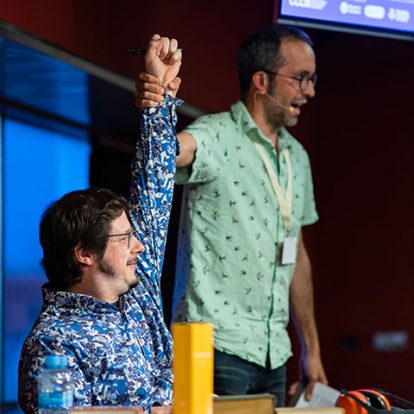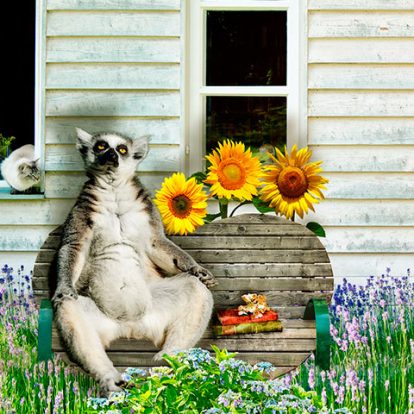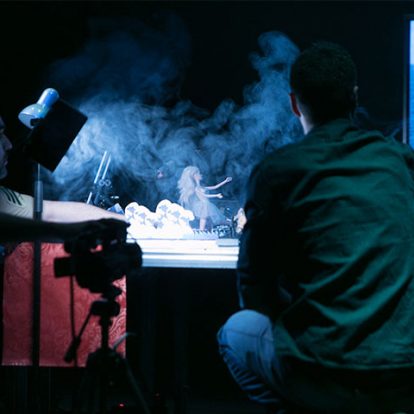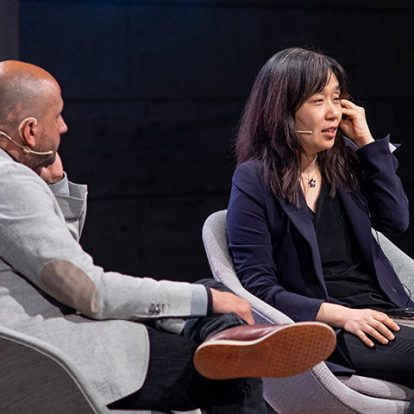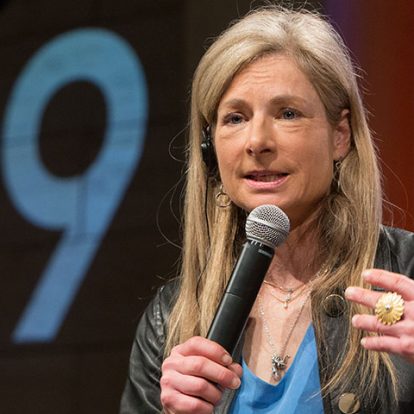Stories Lab
K Team
06 June 2019
At Kosmopolis, we’ve created a space for sharing, discussing and testing out new tools and channels for the stories that make the world go round. These are some of the activities of the Stories Lab that we were able to see at K19.
Debat a bat (Wide Open Debate), Encouraging Dialogue with Young People Through Illustrated Albums. Mon Mas, Beatriz Martin Vidal and Martha Escudero
VO Catalan and Spanish
Debat a bat is a project created by Mon Mas to enable educational work with young people between the ages of 12 and 16 through illustrated albums. In this talk we explore how the spoken and written illustrated classics offer the chance to enter the labyrinth of major universal issues.
The ‘Bit’ Generation: Writing for New Formats. Beatriz Liebe, Daniel Calabuig, Blanca Bardagil, Ana Alonso, Oriol Ripoll and Marisol López
VO Catalan and Spanish
How do you write a play for robots? And what about writing for a podcast or a videogame? How can you play with a book without losing the textual essence? Can you tell a story on Instagram? In this round table we aim to analyse the extent to which the physical format conditions the story, by presenting several innovative cases of local productions.
«Is the Novel Always Better?», Adapted. Víctor Santos, Anna Soler-Pont, Lolita Bosch and Víctor Sala
OV Catalan and Spanish
Often when discussing film adaptations of a novel or a comic, only those who have created the adaptation take part: scriptwriters or directors who have taken a pre-existing work and made it their own. But what about the authors? How do they see this new creation?
«Is the Novel Always Better?», I want to adapt this film or comic; what should I do? Ignacio Monter
OV Spanish
During the creative process, legal questions often arise that can get in the way. In this practical session, the lawyer for Guionistes Associats de Catalunya (Associated Scriptwriters of Catalonia) answers some common questions about adaptations.
«Is the Novel Always Better?», Adapters. Coral Cruz, David Trueba, Alberto Marini and Mònica García
OV Spanish
We have a debate with leading adapters. When you adapt a work of literature, it might seem like you’re starting off with part of the work already done, but the truth is that bringing together two languages as different as literature and film is complicated.
Android Love. Libby Heaney, Joana Moll and Núria Gómez Gabriel
OV Spanish, Catalan and English (View OV with translation into Catalan)
Of all the spheres of romantic connection, the technological is currently the most controversial. In online dating, love is a distance literary meeting, while intimacy is a negotiation of digital systems that connect people. What role do AI systems play in this model of intimacy?
Doubles Vies (Non-Fiction). Talk with Marcel Ventura, Jordi Panyella and Bernat Ruiz Domènech
VO Catalan and Spanish
Talk about the film Doubles Vies (Non-Fiction) by Olivier Assayas (France, 2018), a portrait of current times in publishing, in which analogue comes up against the new digital formats.
The Audible Decade: The Impact of Voice Assistants, Podcasts and Audiobooks in the World of Books in the Next 10 Years. Javier Celaya
OV Spanish
We analyse the impact of new voice assistants, podcasts and audiobooks in the world of books and we make a prediction as to the profile of readers in the coming decade.
Challenging Complexity: How Publications Change What it Means to be a Digital Library. Caylin Smith (British Library)
OV English (View OV with translation into Catalan)
The nature of narration is changing through the possibilities offered by digital technologies. Libraries are just beginning to understand this, and a new dimension has opened up in which to store these digital publications, much more complex than those of previous times.
Creative Artificial Intelligences. Anna Giralt Gris, Carme Torras, Lali Barrière and Carles Sora
OV Catalan
At a moment when artificial intelligence has made a major leap in its creative applications, we wish to create a space for debate as to the nature of automated artistic creation. We share a stage with scientists and artists who are experts in artificial intelligence, philosophy, literature and robotics.
Josep Pedrals, Taller Estampa and Carles Pedragosa. Deep Blue Rhapsody
OV Catalan and Spanish
An artificial intelligence has read all the sonnets by Josep Pedrals and has thus learnt to create poetry. Or that’s what it wants us to believe. We pit man against machine for a live poetry impro face-off: Pedrals vs The Bad Student.
Talking About Books: From Literary Criticism to Podcasts, Booktubers and Book Clubs. Marina Porras, Marc Rovira, Marta Botet Borràs, Ricard Ruiz Garzón, Marc Pastor y Albert Forns
OV Catalan
In this talk, we introduce some of the spaces where we can talk about books, from literary criticism magazines to reading clubs, organised by Catalan libraries with very good attendance, through to new spaces for discussion on the Internet.

